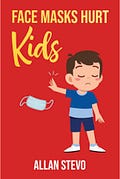The Overweight, Those With COPD, Lung Disease, Cardiac Disease, Pregnant Women, And Stroke Patients Must Be Particularly Cautious Around Face Masks
Reason #111 that Face Masks Hurt Kids
Dear Reader,
The wearing of a face mask to protect against a respiratory virus is an act of grand deceit. It is a behavior that defies research on the topic. Wearing a face mask, as this article (one of many) points to — is unsafe to do and is ineffective.
Until the narrative around mandatory masking has changed, each day by 6am Eastern, I will both post here and send out a science-based reason why no one should wear a face mask.
I ask that you help me circulate these pieces to those around you who you believe could most benefit from them. It is important not to remain silent on this topic. These are important discussions to be having with friends, family members, business owners, healthcare practitioners, public servants, and others in the community.
-Allan
There is a narrative that the sick should wear face masks for their safety. That is not accurate. The sick are more vulnerable to external threats to their bodies — face masks included.
The healthy need to be cautious around face masks, because of the serious harm that can be done by wearing a face mask. Those who are ill need to be even more cautious.
In an April 20, 2021 article entitled “Is a Mask That Covers the Mouth and Nose Free from Undesirable Side Effects in Everyday Use and Free of Potential Hazards?”1 Kai Kisielinski identifies an important set of details lost in the 2020 and 2021 frenzy to mask everyone:
“Elderly, high-risk patients with lung disease, cardiac patients, pregnant women or stroke patients are advised to consult a physician to discuss the safety of an N95 mask as their lung volume or cardiopulmonary performance may be reduced.2 A correlation between age and the occurrence of the aforementioned symptoms while wearing a mask has been statistically proven.3 Patients with reduced cardiopulmonary function are at increased risk of developing serious respiratory failure with mask use according to the referenced literature.4 Without the possibility of continuous medical monitoring, it can be concluded that they should not wear masks without close monitoring. The American Asthma and Allergy Society has already advised caution in the use of masks with regard to the Covid-19 pandemic for people with moderate and severe lung disease.5 Since the severely overweight, sleep apnea patients and overlap-COPD sufferers are known to be prone to hypercapnia, they also represent a risk group for serious adverse health effects under extensive mask use.6 This is because the potential of masks to produce CO2 retention may not only have a disruptive effect on the blood gases and respiratory physiology of sufferers, but may also lead to further serious adverse health effects in the long-term. Interestingly, in an animal experiment an increase in CO2 with hypercapnia leads to contraction of smooth airway muscles with constriction of bronchi.7 This effect could explain the observed pulmonary decompensations of patients with lung disease under masks.”2,4
Nine groups of people are here mentioned, constituting large percentages of society, yet the narrative persist that masks are mandatory, safe, and effective. To the savvy person none of these are true. In fact, masks are optional, unsafe, and ineffective.
Kisielinski K, Giboni P, Prescher A, et al. Is a Mask That Covers the Mouth and Nose Free from Undesirable Side Effects in Everyday Use and Free of Potential Hazards? International Journal of Environmental Research and Public Health. 2021;18(8):4344. doi:10.3390/ijerph18084344.
Kyung, S.Y.; Kim, Y.; Hwang, H.; Park, J.-W.; Jeong, S.H. Risks of N95 Face Mask Use in Subjects with COPD. Respir. Care 2020, 65, 658–664.
Rebmann, T.; Carrico, R.; Wang, J. Physiologic and Other Effects and Compliance with Long-Term Respirator Use among Medical Intensive Care Unit Nurses. Am. J. Infect. Control 2013, 41, 1218–1223.
Kao, T.-W.; Huang, K.-C.; Huang, Y.-L.; Tsai, T.-J.; Hsieh, B.-S.; Wu, M.-S. The Physiological Impact of Wearing an N95 Mask during Hemodialysis as a Precaution against SARS in Patients with End-Stage Renal Disease. J. Formos. Med. Assoc. 2004, 103, 624–628.
AAFA Community Services. What People with Asthma Need to Know about Face Masks and Coverings during the COVID-19 Pandemic. Available online: https://community.aafa.org/blog/what-people-with-asthma-need-to-know-about-face-masksand-coverings-during-the-covid-19-pandemic (accessed on 29 January 2021).
Kaw, R.; Hernandez, A.V.; Walker, E.; Aboussouan, L.; Mokhlesi, B. Determinants of Hypercapnia in Obese Patients with Obstructive Sleep Apnea: A Systematic Review and Metaanalysis of Cohort Studies. Chest 2009, 136, 787–796.
Shigemura, M.; Lecuona, E.; Angulo, M.; Homma, T.; Rodríguez, D.A.; Gonzalez-Gonzalez, F.J.; Welch, L.C.; Ama-relle, L.; Kim, S.-J.; Kaminski, N.; et al. Hypercapnia Increases Airway Smooth Muscle Contractility via Caspase-7-Mediated MiR-133a-RhoA Signaling. Sci. Transl. Med. 2018, 10, eaat1662.
The bestselling book "Face Masks In One Lesson" by Allan Stevo describes how to never wear a face mask again. The follow-up to the book, "Face Masks Hurt Kids," describes why to never wear a face mask again. We must defeat the awful, narrative around the mandates.
Examples of how face masks hurt kids will be posted to the Lockdown Land Substack each morning by 6am Eastern until the narrative around this ineffective and harmful medical intervention has shifted. Face masks are, in fact, not just harmful to children. Face masks are harmful to everyone. Thank you so much for helping me circulate this research.


